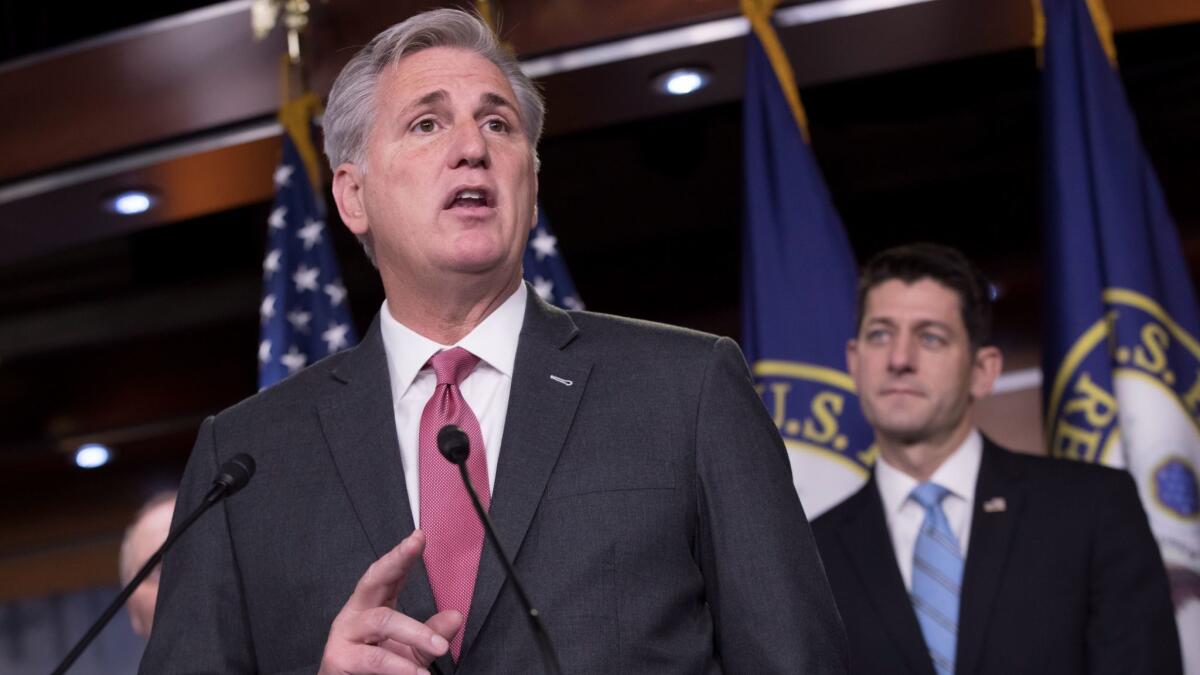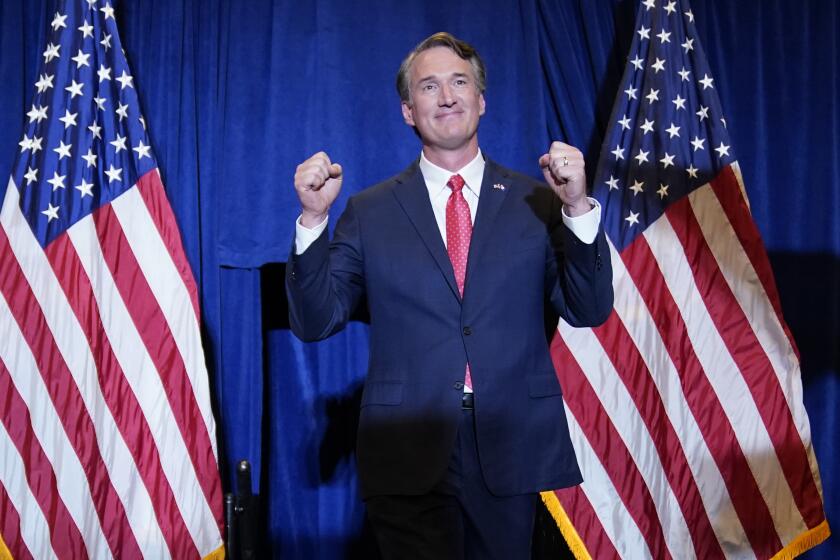House signals openness to delaying cut in corporate tax rates

Reporting from Washington — House Speaker Paul D. Ryan opened the door Wednesday to delaying the implementation of a new 20% corporate tax rate — the cornerstone of President Trump’s plan — amid worries that the GOP proposal will exceed its target of adding no more than $1.5 trillion to the deficit.
Postponing the tax cut for a year or two would diverge from Trump’s insistence that corporate rate reductions be made immediately. But Senate Republicans floated the idea this week as they frantically search for ways to pay for the corporate tax cuts and still provide relief to middle-income households.
Senators plan to introduce their bill Thursday. Sen. David Perdue (R-Ga.) said one revenue-raiser that will probably be included is a full repeal of all state and local tax deductions, including property taxes, a big blow to many residents in California and other high-tax states.
The House version, introduced last week, would cut the corporate rate immediately from the current 35%. But Ryan suggested Wednesday that there was room for compromise.
“Phasing in the corporate reduction still is very good for economic growth,” Ryan said on Fox News Radio. “You still get very fast economic growth and you actually are encouraging companies to spend on factories and plants and equipment and hiring people sooner with the phase in.”
White House officials including Treasury Secretary Steven T. Mnuchin huddled with Senate Finance Committee Republicans late Wednesday in the Capitol. “There’s still a lot of work to do,” said Sen. Orrin G. Hatch (R-Utah), the committee chairman, as the meeting broke up.
The last-minute revisions come as nonpartisan analysts raised fresh concerns about the Republican tax plan, leaving lawmakers uneasy about a package that is taking on debt to favor corporations and wealthier Americans.
Despite Republican assurances that their legislation would give Americans in every income range a cut, many middle-class taxpayers will end up paying more under the House GOP tax plan, a congressional analysis concluded.
About 11% of taxpayers with incomes between $75,000 and $100,000 would see a tax increase of at least $100 in 2019, according to the Joint Committee on Taxation. By 2027, that figure would jump to 26% of taxpayers.
Across all income categories, 6 in 10 Americans would get a tax cut of at least $100 in 2019, the congressional analysis found. About 8% would see a tax increase of more than $100. And nearly a third — 31% — would get a negligible tax change of less than $100 in either direction.
In 2027, about 46% of Americans would get a tax cut of at least $100. Nearly 20% of people would have a tax increase of at least $100.
“When you go beyond the averages, it’s very clear that this is the opposite of a middle-class tax cut,” Rep. Sander M. Levin (D-Mich.) said of the analysis.
Estimated costs of the tax plan are also rising. Deficits would be increased by $1.7 trillion under the House bill, the Congressional Budget Office said Wednesday, which would be beyond the $1.5 trillion Republicans already agreed to allow under special budget rules that enable easier Senate passage.
Deficit worries are likely to grow with other changes being made to preserve deductions prized by business groups and others. Those amendments, approved by the Ways and Means Committee this week, added an additional $160 billion to the deficit, according to a preliminary report by the Joint Committee of Taxation.
Senate Republicans are casting about for ways to bring in more revenue to improve the deficit outlook and bolster the savings for middle-income Americans.
Delaying the corporate rate or allowing it to expire at the end of the decade, rather than continue permanently, are ways to bring down the costs. But not all senators support the idea. Perdue, for example, called the delay a “gimmick” to keep the costs within the $1.5 trillion target.
Senate Republicans are also expected to eliminate all state, local and property tax deductions. Such a change would provide as much as $600 billion in savings over 10 years, mostly coming from individual taxpayers in high-cost states like California, New York and New Jersey.
House Republicans, in their plan, eliminated deductions for state and local income and sales taxes, but preserved property tax write-offs with a cap of $10,000, after East Coast Republicans threatened to withhold their support.
GOP senators are less worried about ending such deductions since those states are represented by Democrats.
The Senate bill is also likely to keep the estate tax, though with higher exemption thresholds, despite longtime efforts by Republicans to repeal it.
And while the House sets a $1-million income threshold for couples for the top 39.6% rate, and consolidates other brackets, the Senate version will probably lower the income level for the top tax, and retain more brackets.
Republican senators also said they were fighting back attempts to cap contributions to tax-deferred 401(k) retirement savings, an idea that Trump has already rejected. “I put down a strong marker on that,” said Sen. Steve Daines (R-Mont.). “The president’s there, too.”
But senators were seriously considering tacking on a repeal of the individual mandate in the Affordable Care Act, which would save $338 billion in revenue from federal subsidies that would no longer be paid to help middle-income Americans buy insurance policies.
“I think it’s getting serious discussion,” said Sen. Daniel Sullivan (R-Alaska).
At the same time, Senate Republicans may add to the bill’s costs through other adjustments, which may include preserving the mortgage interest deduction at $1 million, rather than the lower $500,000 cap in the House GOP bill.
Senators also want to expand the tax savings for small businesses that qualify for the proposed lower 25% rate for so-called pass-through businesses, currently taxed at the individual rates.
The political stakes are higher for Republicans, especially after voters gave victories to Democrats in Tuesday’s elections in what many saw as a repudiation of Trump and the GOP agenda.
Senate Minority Leader Charles E. Schumer said the election results should serve as “stop sign” for Republicans on a tax plan that is “so bad” for suburban households that voted for Democrats.
On Wednesday, the nonpartisan Tax Policy Center released an analysis of the bill that said 76% of Americans would get a tax cut in 2018, averaging about $1,900. About 7% would get an increase, averaging $2,140. The analysis included all people with cuts or increases, while the congressional analysis counted only those with a change of $100 or more.
By 2027, the Tax Policy Center said, 59% of Americans would get a tax cut, averaging $2,330. The number of people with an increase would rise to 26%, with an average hike of $2,080.
The Tax Policy Center originally released its analysis Monday, but then abruptly withdrew the report after discovering an error. The new analysis was roughly similar to the first one, concluding that the greatest benefit from the tax bill would go to upper-income households.
Middle-income taxpayers — those earning between $48,600 and $86,100 annually — would receive an average tax cut of $840 next year, or about 1.3% of their after-tax income, the analysis said. That cut would amount to about 14% of the total benefits from the plan.
The top 20% of the nation’s earners — those making more than $149,400 a year — would receive an average tax cut of $4,840, or about 1.4% of after-tax income. Their share of the total benefits would be 57%.
By 2027, when the estate tax is fully phased out, the top 20% of earners would receive 73% of the benefit of the bill’s cuts. Middle-income earners would get 9% of the benefit.
ALSO
Is this small-town congressman from New Mexico tough enough to win Democrats the House majority?
More coverage of politics and the White House
UPDATES:
3:50 p.m.: This article was updated with comments from Reps. Ryan and Perdue, and details of an analysis by the Tax Policy Center.
This article originally was published at 11:30 a.m.
More to Read
Get the L.A. Times Politics newsletter
Deeply reported insights into legislation, politics and policy from Sacramento, Washington and beyond. In your inbox three times per week.
You may occasionally receive promotional content from the Los Angeles Times.












